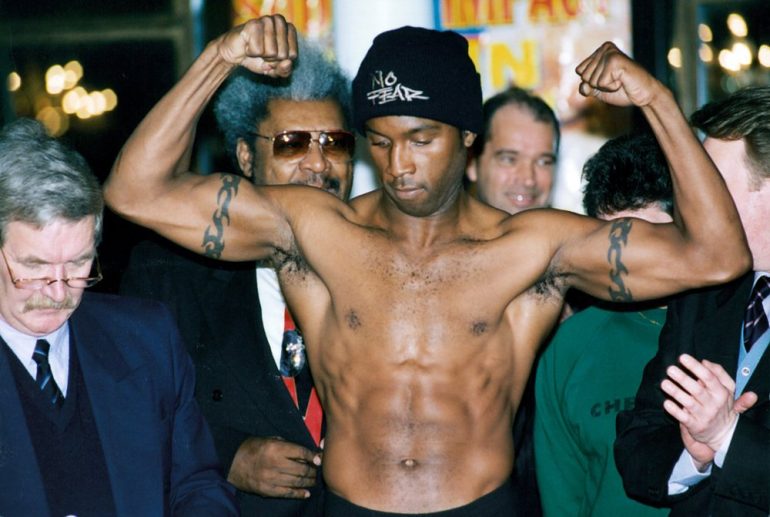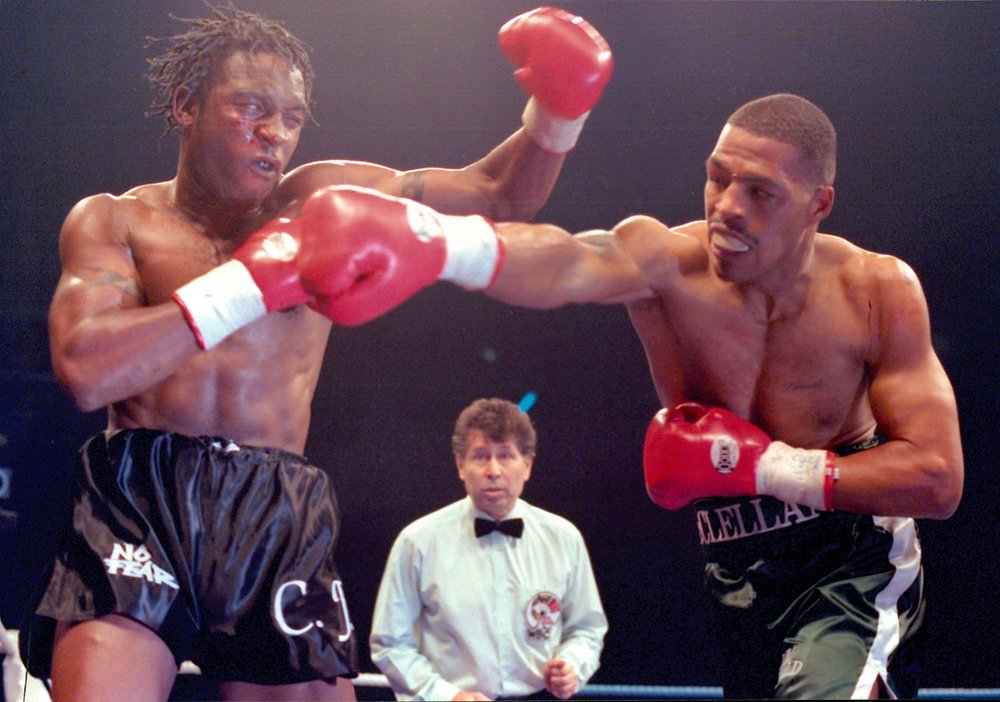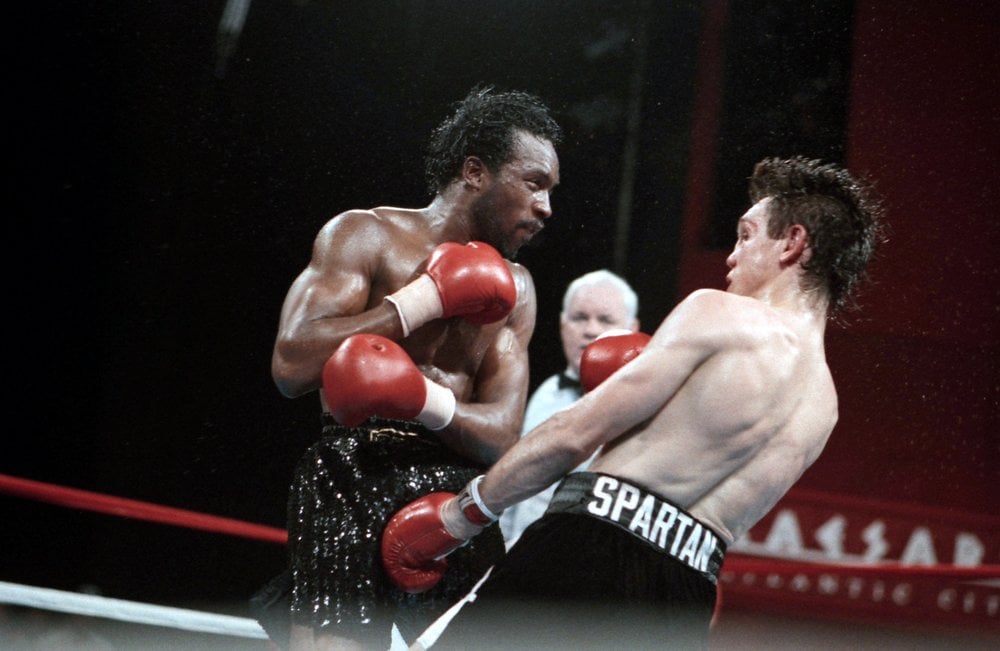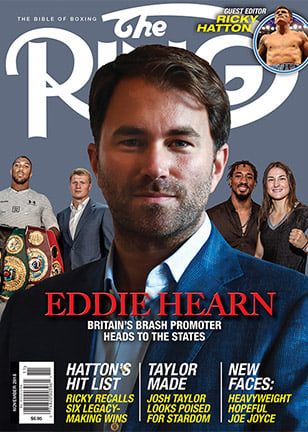Gray Matter: Dark Destroyer Nigel Benn should enter the hall

A large sun tattoo almost completely covers Nigel Benn’s back and there is irony in the artwork.
On Feb. 25, 1995, both Benn and Gerald McClellan waged war against each other at the London Arena and ignored the limitations of the human body. Like Icarus, the pair flew too close to the sun and the wax from their respective wings melted as the heat of ferocious combat became unbearable.
Benn, who prevailed via 10th-round knockout, sustained nose and jaw injuries, a CT-scan “shadow on the brain” (indicative of bruising or lesions due to concussive blows), and his kidneys were so battered that he urinated blood for three days. And he was the lucky one. McClellan, a top-10 pound-for-pound entrant coming into the bout, suffered permanent brain damage and he is confined to a wheelchair with limited vision and hearing.
When you remove the tragedy from the equation, a near-impossible task, you are left with one of the greatest prizefights of the last half-century. The fight was of the same motif as the first meeting between Aaron Pryor and Alexis Arguello, or the first meeting between Diego Corrales and Jose Luis Castillo. But while those epic battles are celebrated, Benn-McClellan is, for the most part, locked away and ignored.

Benn (left) at war with McClellan. Photo by The Ring Archive
For a very long time, I have felt that Benn is Hall of Fame worthy and several respected journalists, on both sides of the pond, agree. However, the disconcerting thing is that I can’t justify Benn’s trip to Canastota without acknowledging that the McClellan victory is the centerpiece of his career. That doesn’t sit well with me, and it won’t sit well with Benn either. The former champion once told me that he could never answer someone who asked him to name his “best” fight because “someone got hurt.”
Benn’s career can be split into two parts. There was the rampaging power-puncher who was 22-0 (22 knockouts) with half of those victories coming inside a single round. Later, following stoppage defeats to countrymen Michael Watson and Chris Eubank, there was the more professional and polished version, who could box and brawl. However, no matter what technical nuances were added to his formidable repertoire, Benn, at heart, was a blood and guts warrior. No fighter was more dangerous when hurt.
On April 29, 1990, Benn won the first of two world titles away from home. The WBO middleweight championship had only been in circulation for a year when Benn wrenched it from super-tough Youngstown, Ohio native Doug DeWitt. It was an action-packed contest in Atlantic City and Benn, who was decked by a left hook in the second, scored a violent eighth-round stoppage, breaking his left hand with the final punch he landed.
In his only successful title defense, Benn overcame feared American brawler Iran Barkley in a classic shootout. Perhaps intimidated by the challenger’s reputation, Benn attacked like a dog from the opening bell, flooring Barkley inside 20 seconds. Nothing was ever easy with Benn, though. He was rocked badly by a left hook counter punch before ending the fight in emphatic fashion. Two more knockdowns saw “The Blade” blunted inside one round.
Having outgrown the middleweight division, Benn settled into the 168-pound weight class slowly and deliberately. In order to fight for the WBC super middleweight title, “The Dark Destroyer” ventured to Marino, Italy, to take on home champion Mauro Galvano on Oct. 3, 1992. In the second round, a series of right hands from Benn opened a cut over Galvano’s left eye and the Italian’s corner pulled him out at the end of round three.

Benn (left) attacks DeWitt. Photo by The Ring Archive
Following that historic victory, Benn promised to give his new belt to former rival and friend Michael Watson, who had suffered permanent brain damage in a stoppage defeat to Eubank five months earlier. Little could the new champion have known that he would be involved in his own tragedy less than two-and-a-half-years later.
Benn made nine defenses of the WBC title and should have had revenge over his old rival in October 1993. Eubank, the long-reigning WBO titleholder, put forth a good effort but was outworked for large portions of the contest. Personally, I have never encountered a single person who felt that Eubank won the rematch which was declared a 12-round split-decision draw.
Following the McClellan war, Benn was damaged goods, and a storybook ending to his boxing career seemed unlikely. At 31, his prime years had been battered out of him. A points loss to Sugar Boy Malinga was followed by a brace of stoppage defeats to teak-tough Irishman Steve Collins. Put simply, Benn was no longer Benn. He retired with a record of 42-5-1 (32 knockouts).
You may ask why I’ve not included Eubank for possible Hall of Fame induction, after all, the pair are inextricably linked. While I wouldn’t complain if “Simply the Best” got the vote, I do feel that Benn has a stronger case. Eubank once admitted that he purposefully avoided Roy Jones Jr. and James Toney during his championship reign. Now, whether that was habitual eccentric rhetoric coming to the surface, we’ll never know, but the revelation stayed with me.
Benn took on all comers, and he was one of the most exciting fighters of his generation. It just so happens that his defining moment was diluted by tragedy.
Tom Gray is Associate Editor for Ring Magazine. Follow him on Twitter: @Tom_Gray_Boxing
Struggling to locate a copy of The Ring Magazine? Try here or
Subscribe

You can order the current issue, which is on newsstands, or back issues from our subscribe page.















